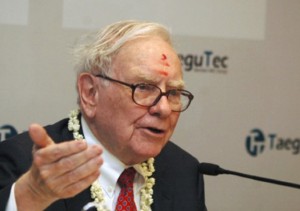There is a reason that the bull is one of the symbols of Wall Street — there are a lot of bullshitters who work there. I’ve worked with a lot of them; few are actually worth their salaries. However, when you do find someone who knows his or her stuff, it’s best to listen carefully and take notes. Every year, Warren Buffett, the world’s most successful investor, writes a letter to the shareholders of Berkshire Hathaway, the company that forms the basis of his business empire. As ever, his ideas are more than worth considering.
Just how good are Warren and his partner Charlie Munger? Just how good was Michelangelo? Unlike Mikey, though, Warren and Charlie (no disrespect, but they look too much like my grandfathers to call them “Mister”) can quantify their expertise. Warren wrote, “Since 1970, our per-share investments have increased at a rate of 19.3% compounded annually, and our earnings figure has grown at a 20.6% clip.” On average, they beat the S&P 500 by 11% each and every year. If you bought $1,000 of stock in 1970, that investment would be on the far side of $10,000,000 today.
In this year’s letter, Warren talked about two investments he made that sum up his approach. Both are real estate deals. And purchases came after the previous owner went bust.
“In 1986, I purchased a 400-acre farm, located 50 miles north of Omaha, from the FDIC. It cost me $280,000, considerably less than what a failed bank had lent against the farm a few years earlier. I knew nothing about operating a farm. But I have a son who loves farming.” The kid gave Warren enough information to calculate the farm would return 10% a year. “I needed no unusual knowledge or intelligence to conclude that the investment had no downside and potentially had substantial upside.” The upside? “Now, 28 years later, the farm has tripled its earnings and is worth five times or more what I paid. I still know nothing about farming and recently made just my second visit to the farm.”
The other deal was quite a ways removed from Nebraska farming; he bought a parcel of land on the island of Manhattan in 1993. It was by New York University and the Resolution Trust Corporation, which was created to clean up the Savings and Loan mess from the 1980s, was selling it. “As had been the case with the farm, the unleveraged current yield from the property was about 10%. But the property had been undermanaged by the RTC…. Annual distributions now exceed 35% of our original equity investment. Moreover, our original mortgage was refinanced in 1996 and again in 1999, moves that allowed several special distributions totaling more than 150% of what we had invested. I’ve yet to view the property.”
So, how does he do it? He provided some rules that I think every investor should think about.
First, “You don’t need to be an expert in order to achieve satisfactory investment returns.” That isn’t to say the ignorance is on a par with knowledge, but rather you just have to rely on people who know what they are doing. You don’t have to know it all yourself. So, he advises, “Keep things simple and don’t swing for the fences. When promised quick profits, respond with a quick ‘no.’”
Next, “Focus on the future productivity of the asset you are considering.” If you don’t feel comfortable making a “rough estimate,” don’t invest. Move on.
Remember, “If you instead focus on the prospective price change of a contemplated purchase, you are speculating.” He’s not against speculation, but there is a real difference. If you have a productive asset, you will have something that has value over the long term. If you are hoping the price of the asset changes, you need to find someone willing to pay more than you did. This is what I call the “bigger idiot problem.” You have to find a bigger idiot than you were to take the asset off your hands, and sometimes, you are the biggest idiot.
Warren also observes, “Games are won by players who focus on the playing field — not by those whose eyes are glued to the scoreboard. If you can enjoy Saturdays and Sundays without looking at stock prices, give it a try on weekdays.” If you invest rather than speculate, you don’t care about price changes from Tuesday to Wednesday; you care about the change from the 20th century to the 21st. Daily price changes are just noise.
Finally, “Forming macro opinions or listening to the macro or market predictions of others is a waste of time. Indeed, it is dangerous because it may blur your vision of the facts that are truly important.” In 1986, buying a farm while family farms were dying all over the country probably looked like a bad idea. But Warren wasn’t buying a farm, he was buying a particular farm that made long-term sense as an investment.
I can think of several hedge fund managers, market strategists and economists who would disagree with Warren and Charlie. I can’t think of any whose investment ideas outperform theirs though.





